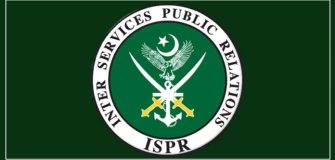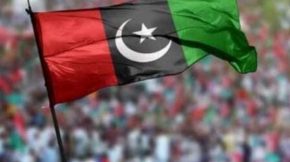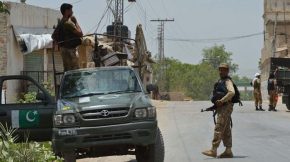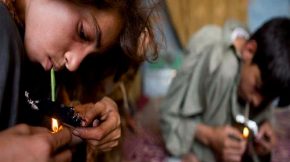Maulana Abdul Aziz, who dodged an arrest a day ago leading to road blockages by his supporters near Islamabad’s Lal Masjid, has been booked over terror charges
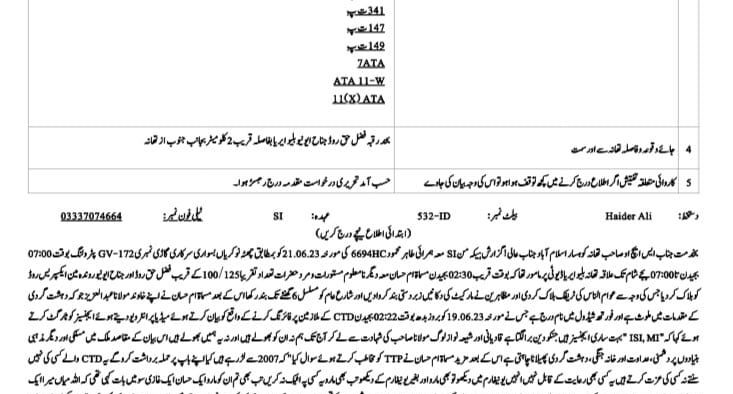
Maulana Abdul Aziz, who dodged an arrest a day ago leading to road blockages by his supporters near Islamabad’s Lal Masjid, has been booked over terror charges along with four others, it emerged on Thursday.
A day ago, Aziz evaded arrest after his guards put up resistance to the police team, following which female students of Jamia Hafsa wielding batons blocked roads in protest of the attempted arrest.
a senior official of the capital administration had acknowledged that a team from the Counter-Terrorism Department (CTD) had gone to Lal Masjid to talk to Aziz and ask him to present himself for clearing certain queries.
Among the queries was his re-emergence as a prayer leader in Lal Masjid — despite the fact that he had retired and was replaced — and attempts to take control over the adjoining plot of the former children’s library as well as other matters.
Senior officials of Islamabad police had made several attempts to talk them out of their protests.
During the protest, the seminary students also beat female constables with sticks. However, by Wednesday evening all roads were cleared.
The first information report (FIR), was filed at the CTD police station by its Station House Officer (SHO) Shamsul Akbar on Wednesday shortly after the incident took place.
It invokes Sections 148 (rioting, armed with deadly weapon), 149 (unlawful assembly guilty of offence committed in prosecution of common object), 186 (obstructing public servant in discharge of public functions), 353 (assault or criminal force to deter public servant from discharge of his duty), 427 (mischief causing damage to the amount of fifty rupees) and 324 (attempt to commit qatl-i-amd) of the Pakistan Penal Code.
The FIR also invokes Sections 7 (punishment for acts of terrorism) and 11E (measure to be taken against a proscribed organisation) of the Anti-Terrorism Act.
The SHO, in the FIR, states that his team was alerted that a “white double-cabin vehicle carrying suspicious armed people” was coming from the Melody Signal. Subsequently, all police teams were positioned accordingly, following which “a white double-cabin vehicle, with registered number CK-7590, arrived”.
The complainant added that the vehicle, which was carrying five people, was signalled to stop.
Upon this, three of the passengers — Murad Khan who was armed with a baton, Abrar Ahmad who was armed with a sub-machine gun (SMG) and Sarfaraz Hussein who was also armed with an SMG — came out of the vehicle and the two armed men opened fire at the police team “with the intention to kill”.
The FIR went on to state that the remaining two persons in the car were the driver, Manzoor, and the Maulana.
The SHO recalled that the cleric was wanted in cases registered under the ATA and that his name was also included in the fourth schedule — a section of the ATA under which someone suspected of terrorism is kept under observation.
He further said that Aziz, while remaining inside the car, opened “direct fire” at the police team, including him, “with the intent to kill and to spread terror” and then fled.
The complainant added, “Fortunately, we remained safe [but] the bullets hit the car, causing damage to the car’s body.” He noted that the three men who came out of the car were then detained, following which an SMG with a loaded magazine was recovered from Ahmad.
Furthermore, another SMG with a magazine was recovered from Hussein and neither of the two men could present a license or permit for the weapons, the FIR states. It also added that a baton was recovered from the third man.
The complaint went on to state that 11 cases of bullets were found scattered on the ground, which were taken into police custody as evidence along with other arms and ammunition recovered.
The FIR asserted that by attacking the police party, keeping unlicensed weapons and “plotting in connivance” with Aziz, the suspects’ aim was to “spread fear in state institutions, the public, and law enforcement agencies”.
“By publicly opening fire at a police party in this manner, fear was spread among the public and the law enforcement agencies,” it added.
Aziz’s statement
Meanwhile, on his part, Aziz released his video statement on social media yesterday, in which he said that some “official vehicles” had come to arrest him as soon as he left Lal Masjid after leading Zuhr prayers.
“Two CTD vehicles chased me and stopped my car and then several personnel came out and tried to arrest me; they fired at us, which led to a fight. I got injured; you can see my car but my gun failed to fire,” Aziz claimed, adding that four to five CTD personnel got hold of him and pinned him down.
“I was injured but with the help of divine strength I got hold of the gun of one of the personnel and started firing. In the meantime, a large number of people gathered, which gave me an opportunity to escape,” Maulana said.
He said despite being injured, he was able to reach Jamia Hafsa.
A footage had shown his car was parked on the Kulsoom Plaza bridge on 7th Avenue with bullet holes on the windscreen.
Following the incident, fiery speeches were made by Umme Hasaan, the cleric’s wife.
Later in a video message, Umme Hasaan had said the Maulana fired several rounds at the CTD team and there was crossfire. He was pinned down by the CTD officials after his AK-47 ran out of bullets. However, he was able to break free and with the help of the area people, reached Jamia Hafsa in G-7.
In her video message, she even sought help from the proscribed Tehreek-i-Taliban Pakistan (TTP), asking them not to stay quiet.
Lal Masjid’s legacy
Situated at the centre of the capital city, Lal Masjid came to prominence when the then-military ruler Gen Pervez Musharraf carried out a full-fledged military operation in July 2007.
Aziz was arrested the same month while attempting to flee in a burqa and more than 1,100 supporters of him and his brother surrendered unconditionally.
A 2017 EOS report states that from 2007-2017, a total of 35 cases have been registered against Aziz but he was then acquitted in all those cases in 2017.
Despite being dismissed from his position as a prayer leader in 2004, he has repeatedly occupied the Lal Masjid several times, including in March 2019, February 2020 and September 2022.
Perhaps the most publicised case against Aziz was brought by civil society activists in December 2014 who claimed they received death threats from the cleric after protesting his refusal to condemn the massacre at Army Public School-Peshawar.
On New Year’s Day 2015, an Inter-Services Intelligence report was leaked to the media that contained details of Aziz’s links to terror outfits.
It reiterated evidence of links between the TTP and Aziz, noting that the Taliban had nominated him as their representative to negotiate a peace deal with the government. It also linked the cleric to a land grabber and a property tycoon.





